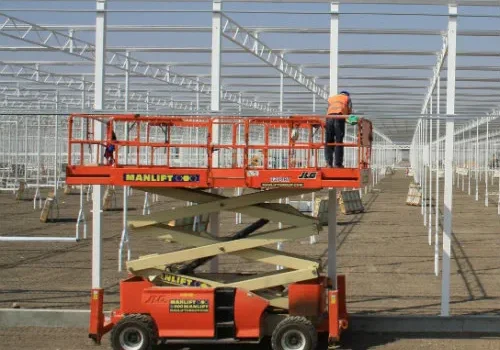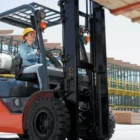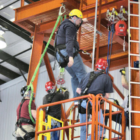Scissor Lift Training in Toronto: Mobile Elevating Work Platform
The demand for skilled workers in the construction and industrial sectors in Toronto is on the rise. As these industries continue to grow, so does the need for specialized training to operate heavy machinery safely and efficiently. Scissor lifts are a common sight at construction sites and warehouses and ensuring that operators are well-trained is crucial for preventing accidents and maintaining a productive work environment. In this blog, we will explore the importance of scissor lift training in Toronto, also known as Mobile Elevating Work Platform (MEWP) training, and how it can benefit both employees and employers.
Scissor Lifts in Toronto: A Common Sight
Scissor lifts, also known as aerial work platforms, are a staple in various industries throughout Toronto. These versatile machines provide a safe and efficient way to work at heights, whether it is for construction, maintenance, or other tasks that require access to elevated areas. Scissor lifts offer stability and mobility, making them ideal for a wide range of applications.
However, the versatility of scissor lifts comes with the responsibility of proper training. Without the right knowledge and skills, operating these machines can lead to accidents and injuries. This is where scissor lift training in Toronto comes into play, ensuring that workers can safely and efficiently operate these MEWPs.
Importance of Scissor Lift Training in Toronto
1. Safety First
One of the most critical reasons for scissor lift training in Toronto is safety. The construction and industrial sectors are among the most dangerous in terms of workplace accidents and injuries. Operating scissor lifts without proper training increases the risk of accidents, which can result in severe injuries or even fatalities.
Scissor lift training covers all aspects of safe operation, from pre-operation inspections to on-site protocols. Operators learn how to identify potential hazards, conduct thorough equipment checks, and respond to emergencies. With this knowledge, they can minimize risks and ensure the safety of themselves and their co-workers.
2. Compliance with Regulations
Operating a scissor lift without the necessary training can also lead to legal consequences. In Toronto, as in many other places, there are regulations in place that require operators to be professionally trained and certified to use mobile elevating work platforms. Failure to comply with these regulations can result in fines and legal issues for both individuals and companies.
Scissor lift training ensures that operators are in compliance with all relevant regulations and standards. This not only protects individuals but also helps businesses avoid potential legal troubles and fines.
3. Increased Efficiency
Proper scissor lift training does not just focus on safety but also on the efficient operation of the equipment. Trained operators can maximize the use of the scissor lift, leading to improved productivity on the job site. Efficiency is key in construction and industrial settings, where time is often of the essence.
During training, operators learn how to manage the scissor lift with precision, enabling them to perform tasks more effectively. This not only benefits the employer by completing tasks on schedule but also enhances the operator’s own skills and career prospects.
4. Reduced Equipment Damage
Untrained operators are more likely to mishandle scissor lifts, leading to damage to the equipment. These machines are expensive to purchase and maintain, and any damage can result in costly repairs or replacements. Training ensures that operators understand the mechanics and capabilities of the equipment, reducing the risk of accidents that can lead to damage.
5. Career Advancement
For individuals, scissor lift training in Toronto can open up new opportunities and career advancement. As industries continue to grow, the demand for skilled workers is on the rise. Having the necessary training and certifications can make an individual more attractive to potential employers. It can also result in higher pay and job security.
The Skills Learned in Scissor Lift Training
Scissor lift training in Toronto covers a wide range of skills and knowledge, including:
- Equipment Familiarization: Operators learn about the different types of scissor lifts and their components.
- Pre-operation Inspection: Understanding how to conduct a thorough inspection of the scissor lift to identify any issues before operation.
- Safe Operation: Learning how to operate the scissor lift safely, including driving and maneuvering.
- Load Capacity: Understanding the load capacity of the scissor lift and how to distribute weight properly.
- Site-Specific Protocols: Adhering to site-specific safety protocols and hazard identification.
- Emergency Response: Knowing how to respond to emergencies, including how to safely lower the lift in case of a malfunction.
- Regulatory Compliance: Understanding all relevant laws and regulations related to scissor lift operation.
Additional Considerations for Scissor Lift Training
While the previous section covered the fundaental aspects of scissor lift training in Toronto, there are additional considerations to keep in mind. These factors are essential for a comprehensive understanding of the training process and its significance:
1. Practical Hands-On Experience:
Scissor lift training in Toronto often includes practical hands-on experience. This allows operators to become familiar with the equipment, understand its controls, and practice safe operation in a controlled environment. Practical experience is invaluable for building confidence and competence.
2. Renewal and Recertification:
Scissor lift certifications may have an expiration date, typically ranging from two to five years. Regular recertification ensures that operators remain up to date with safety regulations and best practices. It also serves as a reminder to refresh their knowledge and skills.
3. Customized Training:
Scissor lift training can be customized to suit the specific needs of different industries and workplaces in Toronto. This tailored approach helps operators learn how to navigate the unique challenges and conditions of their job sites, such as construction sites, warehouses, or maintenance facilities.
4. Training Options:
In Toronto, scissor lift training is available through various channels, including on-site training, training centers, and online courses. Employers can choose the most convenient option based on their requirements and the needs of their employees.
5. Ongoing Safety Culture:
Training is not a one-time event; it is a continuous process. Creating a safety culture within the workplace is essential for maintaining a safe environment. Encouraging open communication, regular safety meetings, and reporting of potential hazards can significantly contribute to overall safety.
Conclusion
Scissor lift training in Toronto, also known as Mobile Elevating Work Platform (MEWP) training, is crucial for the safety of workers and the success of businesses. It ensures that operators have the knowledge and skills required to operate scissor lifts efficiently and safely. Compliance with regulations, increased efficiency, reduced equipment damage, and career advancement are just a few of the many benefits that come with proper training.
For employers in Toronto, investing in scissor lift training for their employees is an investment in safety and productivity. For individuals, obtaining the necessary training and certification can lead to a promising career in industries that continue to grow and thrive. So, when it comes to scissor lift training in Toronto, the benefits are clear: safety, compliance, and career advancement.





